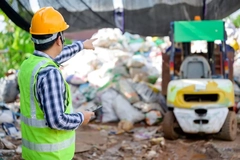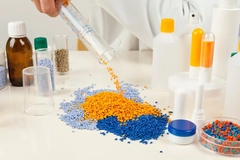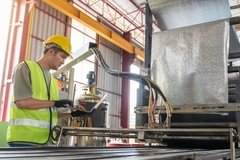“The Burning Question”: Nestlé, Coca-Cola, PepsiCo and Unilever respond to plastic pollution criticism

14 Apr 2020 --- The FMCG giants Nestlé, Coca-Cola, PepsiCo and Unilever have been spotlighted for their respective corporate plastic polluting behavior in a recent report titled The Burning Question by development agency Tearfund. The report summarizes how in just six countries, the four companies combined create enough plastic pollution – defined as plastic dumped or burnt – to cover a football pitch to a depth of 10 cm every 20 minutes. PackagingInsights reached out to the global F&B juggernauts for commentary on the allegations that the companies are too focused on plastic recycling and not enough on plastic reduction through reusability.
The Tearfund report highlights that the four global plastic polluters sell billions of products in single-use packaging in China, India, the Philippines, Brazil, Mexico and Nigeria. They do so despite knowing that packaging waste is not always effectively managed in these regions, consequently leading to pollution, notes Tearfund. Such pollution causes serious harm to environmental and human health.
“Citizens want change. A new survey of 2,000 adults in India conducted for Tearfund by Savanta ComRes in December 2019 found that nine in ten respondents say they would be likely to buy their products in refillable or reusable containers if it led to significantly less plastic pollution in their community and if the cost was the same,” the report reads.
 "Our vision is that none of our packaging, including plastics, ends up in landfill nor in oceans, lakes and rivers," a Nesté spokesperson tells PackagingInsights.As of May 2019, the global companies have each set plastic pollution reduction targets to reach within the next five to ten years. These include:
"Our vision is that none of our packaging, including plastics, ends up in landfill nor in oceans, lakes and rivers," a Nesté spokesperson tells PackagingInsights.As of May 2019, the global companies have each set plastic pollution reduction targets to reach within the next five to ten years. These include:
PepsiCo: Reduce virgin plastic usage in its bottles by 20 percent by 2025.
Coca-Cola: Commitment to collect and recycle the equivalent of one bottle for every bottle sold by 2030.
Nestlé: Reduce virgin plastic by a third by 2025 and to invest 2 billion Swiss Francs (US$2.08 billion) in moving from virgin plastics to food-grade recycled plastic.
Unilever: Reduce virgin plastic by 50 percent by 2025.
For Tearfund, this is not enough. The report calls upon the four companies to scale up their efforts further, stressing they should reduce their amount of single-use plastic products in half by 2025 and use what Tearfund deems more environmentally sustainable packaging applications, notably refillable or reusable containers.
Scaling up reusability efforts
Both PepsiCo and Coca-Cola have previously steered the environmental sustainability discussion toward bolstering recycling infrastructure. In response to the Tearfund report, a PepsiCo spokesperson tells PackagingInsights that the company has pledged over US$51 million to global partnerships designed to boost recycling rates to support a circular economy between July 2018 and 2019. Likewise, a Coca-Cola representative maintains its stance that plastic is “a valuable resource” and should be “used again and again.”
However, growing consumer attraction to reusable applications has encouraged global companies to deliver more refillable packaging concepts. The PepsiCo spokesperson highlights that it is reinventing the packaging it uses by looking “beyond the bottle” through reusable platforms like SodaStream. “We estimate [SodaStream] will avoid nearly 67 billion plastic bottles through 2025,” the spokesperson notes.
In Brazil, Coca-Cola has introduced and expanded a “universal” refillable PET bottle that will prevent over 200 million new PET bottles from entering the market each year. “The share of reusable packaging formats in Brazil today represents around 27 percent of all sales. Currently, Mexico uses more than 20 percent [of Coca-Cola’s] refillable packaging, Nigeria over 30 percent, the Philippines over 40 percent and Tanzania more than 50 percent.” While the debate on reusability versus recyclability continues to sizzle, Tearfund highlights that up to one million annual deaths in developing countries are linked to diseases related to plastic and other mismanaged waste.
While the debate on reusability versus recyclability continues to sizzle, Tearfund highlights that up to one million annual deaths in developing countries are linked to diseases related to plastic and other mismanaged waste.
According to a Nestlé spokesperson, “[the company is] working hard to eliminate non-recyclable plastics and invest in innovative, alternative delivery systems, including bulk, reuse and refill options. Our Nescafe, Milo and Coffee Mate brands are already available via dispensers in many countries around the world for our out-of-home business. We are also rolling out Loop, the subscription home delivery service, in countries where the service is currently or soon to be available.”
Reducing its total use of plastic by more than 100,000 tons demands a “fundamental rethink” in Unilever’s approach to packaging and products, a company spokesperson outlines. “As we speak, we’re piloting different reuse and refill formats across the world, so we can test, learn and scale these solutions,” they state. PackagingInsights has requested more information on Unilever’s pilot projects.
Is it enough?
PepsiCo, Coca-Cola and Nestlé have repeatedly been identified as major polluters by environmentalist organizations such as Greenpeace and Break Free From Plastic. Consequently, the question remains whether the aforementioned reusability initiatives are bold enough to drive measurable change for the planet’s protection or if they will remain largely experimental.
In a previous Tearfund report, the group presented evidence to suggest that between 400,000 and one million annual deaths in developing countries are linked to diseases related to plastic and other mismanaged waste. At the upper end, that is one person every 30 seconds, Tearfund laments.
Ultimately, the Tearfund report highlights that consumers believe manufacturers have the “most responsibility” to act on plastic waste in the environment and “should take the lead,” according to a cited 2019 international survey of customer attitudes, excluding Africa. The burning question remains whether these companies will assume greater corporate responsibility for the global plastic pollution crisis and if their lead will come fast enough to implement substantial changes that will have a lasting effect.
By Anni Schleicher










